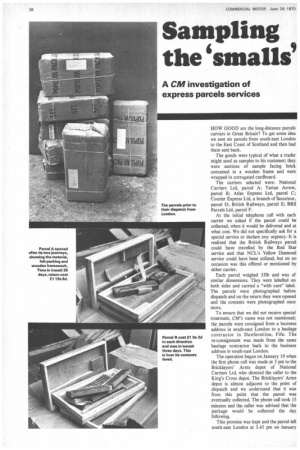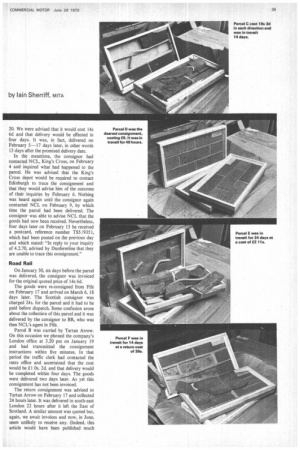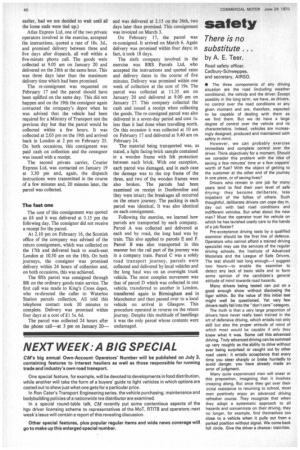Sampling the 'smalls'
Page 40

Page 41

Page 42

If you've noticed an error in this article please click here to report it so we can fix it.
A CM investigation of express parcels services
HOW GOOD are the long-distance parcels carriers in Great Britain? To get some idea we sent six parcels from south-east London to the East Coast of Scotland and then had them sent back.
The goods were typical of what a trader might send as samples to his customer; they were sections of sample facing brick contained in a wooden frame and were wrapped in corrugated cardboard.
The carriers selected were: National Carriers Ltd, parcel A; Tartan Arrow, parcel B; Atlas Express Ltd, parcel C; Courier Express Ltd, a branch of Securicor, parcel D; British Railways, parcel E; BRS Parcels Ltd, parcel F.
At the initial telephone call with each carrier we asked if the parcel could be collected, when it would be delivered and at what cost. We did not specifically ask for a special service or declare any urgency. It is realized that the British Railways parcel could have travelled by the Red Star service and that NCL's Yellow Diamond service could have been utilized, but on no occasion was this offered or mentioned by either carrier.
Each parcel weighed 331b and was of similar dimensions. They were labelled on both sides and carried a "with care" label. The parcels were photographed before dispatch and on the return they were opened and the contents were photographed once more.
To ensure that we did not receive special treatment, CM'S name was not mentioned; the parcels were consigned from a business address in south-east London to a haulage contractor in Dunfermline, Fife. The re-consignment was made from the same haulage contractor back to the business address in south-east London.
The operation began on January 19 when the first phone call was made at 3 pm to the Bricklayers' Arms depot of National Carriers Ltd, who directed the caller to the King's Cross depot. The Bricklayers' Arms depot is almost adjacent to the point of dispatch and we understand that it was from this point that the parcel was eventually collected. The phone call took 15 minutes and the caller was advised that the package would be collected the day following.
This promise was kept and the parcel left south-east London at 3.45 pm on January 20. We were advised that it would cost 14s 6d and that delivery would be effected in four days. It was, in fact, delivered on February 5-17 days later, in other words 13 days after the promised delivery date.
In the meantime, the consignor had contacted NCL, King's Cross, on February 4 and inquired what had happened to the parcel. He was advised that the King's Cross depot would be required to contact Edinburgh to trace the consignment and that they would advise him of the outcome of their inquiries by February 6. Nothing was heard again until the consignor again contacted NCL on February 9, by which time the parcel had been delivered. The consignor was able to advise NCL that the goods had now been received. Nevertheless, four days later on February 13 he received a postcard, reference number TS5 /9351, which had been posted on the previous day and which stated: "In reply to your inquiry of 4.2.70, advised by Dunfermline that they are unable to trace this consignment."
Road Rail
On January 30, six days before the parcel was delivered, the consignor was invoiced for the original quoted price of 14s 6d.
The goods were re-consigned from Fife on February 17 and arrived on March 6, 18 days later. The Scottish consignor was charged 24s, for the parcel and it had to be paid before dispatch. Some confusion arose about the collection of this parcel and it was delivered by the consignor to BR, who was then NCL's agent in Fife.
Parcel B was carried by Tartan Arrow. On this occasion we phoned the company's London office at 3.20 pm on January 19 and had transmitted the consignment instructions within five minutes. In that period the traffic clerk had contacted the rates office and ascertained that the cost would be Ll Os. 2d. and that delivery would be completed within four days. The goods were delivered two days later. As yet this consignment has not been invoiced.
The return consignment was advised to Tartan Arrow on February 17 and collected 24 hours later. It was delivered in south-east London 22 hours after it left the East of Scotland. A similar amount was quoted but, again, we await invoices and now, in June, seem unlikely to receive any. (Indeed, this article would have been published much earlier, had we not decided to wait until all the loose ends were tied up.)
Atlas Express Ltd, one of the two private operators involved in the exercise, accepted the instructions, quoted a rate of 18s. 3d., and promised delivery between three and five days after dispatch, all well within a five-minute phone call. The goods were collected at 9.05 am on January 20 and delivered on the 28th at the same hour. This was three days later than the maximum delivery time which had been promised.
The re-consigment was requested on February 17 and the parcel should have been uplifted on the same day. This did not happen and on the 19th the consignor again contacted the company's depot when he was advised that the vehicle had been required for a Ministry of Transport test the previous day but that the parcel would be collected within a few hours. It was collected at 2.03 pm on the 19th and arrived back in London at 2 pm on February 25. On both occasions, this consigment was paid cash on collection and the consignor was issued with a receipt.
The second private carrier, Courier Express Ltd, was contacted on January 19 at 3.30 pm and, again, the dispatch instructions were transmitted in the course of a few minutes and, 20 minutes later, the parcel was collected.
The fast one The cost of this consignment was quoted as £6 and it was delivered at 3.15 pm the following day. The consignor did not receive a receipt for the parcel.
At 2.10 pm on February 16, the Scottish office of the company was advised of the return consignment, which was collected on the 17th and delivered back to south-east London at 10.50 am on the 18th. On both journeys, the consignor was promised delivery within 24 hours of collection and, on both occasions, this was achieved.
The fifth parcel was consigned through BR on the ordinary goods train service. The first call was made to King's Cross depot, who re-directed the caller to Waterloo Station parcels collection. All told this telephone contact took 30 minutes to complete. Delivery was promised within four days at a cost of £1 5s. 6d.
The parcel was collected 24 hours after the phone call—at 3 pm on January 20—
and was delivered at 2.15 on the 26th, two days later than promised. This consignment was invoiced on March 3.
On February 17, the parcel was re-consigned. It arrived on March 6. Again delivery was promised within four days; in fact, it took 18 days.
The sixth company involved in the exercise was B RS Parcels Ltd, who accepted the instructions and quoted rates and delivery dates in the course of five minutes. Delivery was promised within one week of collection at the cost of 19s. The parcel was collected at 11.35 am on January 20 and delivered at 9.00 am on January 27. This company collected the cash and issued a receipt when collecting the goods. The re-consigned parcel was also delivered in a seven-day period and cost Is. less than it had done when travelling north. On this occasion it was collected at 10 am on February 17 and delivered at 9.40 am on February 24.
The material being transported was, as stated, a light facing-brick sample contained in a wooden frame with felt protection between each brick. With one exception, each parcel was damaged, and in each case the damage was to the top frame of the three, and two of the wooden frames were also broken. The parcels had been examined on receipt in Dunfermline and they were intact; the breakages all occurred on the return journey. The packing in each parcel was identical. It was also identical on each consignment.
Following the exercise, we learned how parcels are transported by each company. Parcel A was collected and delivered at each end by road, the long haul was by train. This also applied to parcels E and F. Parcel B was also transported in this manner but the rail part of the journey was in a company train. Parcel C was a solely road transport journey, parcels were collected and delivered by local vehicles and the long haul was on an overnight trunk vehicle. The most complex movement was that of parcel D which was collected in one vehicle, transferred to another in London. transferred again in Birmingham and in Manchester and then passed over to a local vehicle on arrival in Glasgow. This procedure operated in reverse on the return journey. Despite this multitude of handlings it was the only parcel whose contents were undamaged.






















































































































